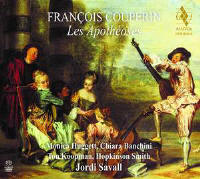Texte paru dans: / Appeared in: Code-barres / Barcode : 8435408099448 |
|
|
Reviewer: Edward
Strickland François le Grand (he never gave 'em a chance to call him le neveu de Couperin, adolescent prodigy that he was) is the greatest composer produced by France (Rameauvians, Romantics, and Impressionists can send their rebuttals—no letter-bombs, please—c/o the Editor), and the Apothéoses may be the greatest of his secular creations, surpassing even the harpsichord works. Hesperion XX had already produced, in their recording of Les Nations, what may be the most impressive single offering in the French Baroque chamber-music discography. So I approached this disc with carefully controlled euphoria.
I was not
disappointed. The sonics are superior, as often with Astrée; here the
guiding spirit is Michel Bernard, who has done so much excellent work for
French Harmonia Mundi. In terms of musical direction, Jordi Savall is not
listed as leader of the consort, for the first time in my experience. This
may be due to the prominence of the violins in these works rather than the
gambas which have been featured in earlier recordings. In any case, the
ensemble seems as mellifluous and impassioned as usual, though I think the
violinists tend to release a bit prematurely in spots. The group, by the
way, is rather strikingly international in composition, including
representatives of Spain, England, Italy, the Netherlands, the United
States, and France.
The American is
Hopkinson Smith, a lutenist-guitarist-theorbist I have praised in the past.
His presence in the continuo adds a marvelous sense of plaintiveness and
warmth to the accounts. Once again, as in their Nations, the ensemble
manages to sound larger than the sum of its parts—this time without winds, a
rather unusual accomplishment. As a result, the mood-changes of the works
are delineated with greater forcefulness than in the exquisite Kuijkens
performance on Pro Arte (which made my Want List some years back): there is
simply more drama here—not more delicacy perhaps, but the delicacy there
appears all the more affectingly in juxtaposition with the more energetic
sections that often frame it. In the Corelli Apothéose, indeed, that framing
is the norm, for the work is largely an adaptation of the slow-fast
alternation of movements in the sonata da chisa. The Lully Apothéose is a
more ambitious (and longer) work, written a year after the 1724 Corelli
tribute, rather didactic—though charmingly so—in its tendentious programming
of the union of French and Italian styles. Couperin was the chief promoter
of that High-Baroque “fusion“ music, and the conclusion of the Lully
Apothéose is his most tersely eloquent argument.
The notes by
Philippe Beaussant are characteristically insightful and provocative, though
I think he overstates the ironic element in the later work, mistaking
conventional grandiloquence for satire in both Couperin's dedication and in
the first section of the piece. This is a superb disc. Not the type I expect to wear out but to turn to rarely and at the proper moment. It may say something about the disc (as well as the French Baroque and the reviewer) to note that I cannot listen to this record in daytime or with the lights on.
| |
|
|
|
|
Cliquez l'un ou l'autre
bouton pour découvrir bien d'autres critiques de CD |
|



